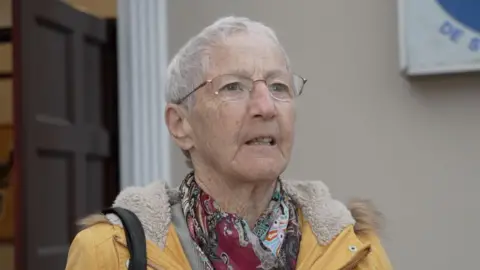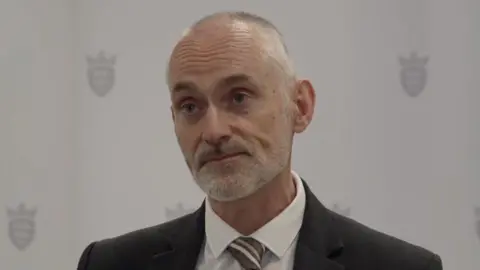Residents 'still waiting' for action on PFAS
 BBC
BBCIslanders affected by the discovery of "forever chemicals" near Jersey's airport have criticised the length of time it has taken to investigate the issue.
The third draft report into polyfluoroalkyl substances (PFAS) and actions to help people exposed to them was published on Wednesday.
During a public meeting at St Brelade Parish Hall earlier this week, people told government officials they felt nothing had happened since the PFAS Scientific Advisory Panel was formed in 2023.
Prof Peter Bradley, Jersey's director of Public Health, said the report would be finalised in early June and there "shouldn't be too much time delay" before recommendations were acted on.
The government said firefighter foam used during the early 1990s contained PFAS, known as "forever chemicals" due to the length of time it takes for them to break down.
People may have been exposed to the chemicals after it leaked into the neighbouring areas and private borehole water supplies while it was used at Jersey Airport's fire training ground.
Research has suggested PFAS exposure could cause serious health conditions such as cancer and fertility issues.
'Nothing has happened'
The latest draft report set out 13 recommendations which included bloodletting, blood testing and offering a cholesterol-lowering medication called Colesevelam to people who met "certain criteria".
Joan Renouf, who attended the meeting in St Brelade, said there was frustration over delays in acting on the recommendations.
"We've had report one, we've had report two, we've had report three and still we're waiting on things happening," she said.
"We're exactly at the same position as we were two years ago but nothing has happened - we're talking about it but it still hasn't happened."

Claire Simon, another resident at the meeting, criticised the government's handling of the situation.
She said: "It took them two years to get something in place. How long's it going to take them to get something going forward?
"I believe that the government will choose the cheapest option, which doesn't benefit the residents, or anybody else on this island to be fair."

Prof Bradley said the process was moving forward and the most advised treatment option was the cholesterol-lowering drug.
He said the drug seemed to to work very well, but there "would be exceptions".
"The report will be finalised in early June, we anticipate," he said.
"There shouldn't be too much time delay before we are able to offer a treatment such as the cholesterol-lowering drugs, which are freely available at the moment, so hopefully there wouldn't be much delay following June."
The government said people could comment on the third draft report by emailing the PFAS panel before 24 April.
Follow BBC Jersey on X and Facebook. Send your story ideas to [email protected].
